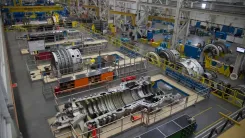Why Did Jupiter Wagons Experience a Nearly 2% Drop in Net Profit for Q4?

Synopsis
Key Takeaways
- Net profit fell by 1.9% in Q4 FY25.
- Total income decreased by 6.2%.
- Expenses were reduced by 6.4%.
- Focus on electric mobility with a new facility.
- Strategic contracts worth over Rs 215 crore secured.
Mumbai, May 19 (NationPress) - The manufacturer of railway wagons and components, Jupiter Wagons, announced on Monday a 1.9% decrease in net profit, amounting to Rs 103 crore in Q4 FY25, down from Rs 105 crore in the same quarter last fiscal year.
The profit before tax (PBT) also saw a decline of 8.26% year-on-year (YoY), falling to Rs 127.47 crore from Rs 138.95 crore, as stated in its stock exchange filing.
The company's consolidated total income decreased, dropping to Rs 1,057 crore from Rs 1,127 crore a year earlier, which equates to a 6.2% decline.
Revenue from operations also fell by about 6.4%, decreasing from Rs 1,115.41 crore in the previous year to Rs 1,044.54 crore in the last quarter of FY25.
Despite this revenue decline, Jupiter Wagons successfully reduced its total expenses to Rs 923.34 crore in Q4, which is 6.4% lower compared to Rs 986.41 crore in the same quarter last year.
However, when compared sequentially, expenses increased by approximately 1.56%, up from Rs 909.16 crore in Q3.
The company's EBITDA (earnings before interest, taxes, depreciation, and amortization) experienced a slight increase, rising to Rs 153 crore from Rs 147 crore last fiscal year, with the EBITDA margin improving to 14.6% from 13.2%.
Shares of Jupiter Wagons Limited fell by Rs 13.1 or 3.1% to close the intra-day trading session at Rs 408.95 on the National Stock Exchange (NSE) on Monday.
Regarding the full financial year, Managing Director Vivek Lohia described FY25 as a transformative period for Jupiter Wagons.
He acknowledged several strategic achievements, including significant contracts with Braithwaite for wheelsets.
“The company also secured brake system contracts exceeding Rs 215 crore,” Lohia stated.
Lohia further emphasized the company's commitment to electric mobility with the launch of a new facility in Pithampur.
“This modern plant is anticipated to spearhead battery production and supply to Indian Railways and private partners, along with orders for complete Battery Energy Storage Systems (BESS),” he added.









